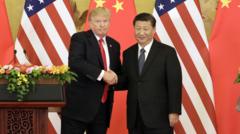Amid escalating trade tensions, the US and China are gearing up for discussions this weekend in Switzerland, marking a significant moment since the onset of tariffs imposed by the Trump administration. As both nations grapple with their economic constraints, they seek a way to de-escalate the trade conflict that has strained their relationship over the past years. But as accusations fly over who initiated the talks, a pragmatic shift is surfacing as both sides seem to recognize the pressing need for dialogue.
**US and China Set for Crucial Trade Talks: What's Behind the Timing?**

**US and China Set for Crucial Trade Talks: What's Behind the Timing?**
As the world's largest economies prepare to meet in Switzerland, questions arise about the dynamics fueling their tentative negotiations.
Following months of escalating tariffs that have inflicted serious tolls on both economies, this high-level meeting comes at a pivotal juncture. The meeting signifies a possible thaw in relations between the two superpowers, who have engaged in a dire contest of tariffs since January. With US tariffs on Chinese goods now spiking to 145%, and counter duties from China at 125%, the economic impact on both sides has become notably severe.
In recent weeks, a somewhat unexpected conciliatory tone has emerged from both parties, despite the history of aggressive rhetoric. Experts believe the current diplomatic engagement is driven by a mutual desire to forge a path forward without appearing weak. "Neither side wants to appear to be backing down," noted Stephen Olson from the ISEAS-Yusof Ishak Institute, echoing the sentiments shared by many analysts observing this crucial moment. There's a strange dance at play: both nations seem intent on not ceding ground while simultaneously acknowledging the need for talks.
China's readiness to negotiate has been framed within the context of its ongoing struggles, as government data indicates a downturn in manufacturing – a sector already feeling the brunt of US tariffs. Amidst Xi Jinping’s diplomatic engagements in Moscow, where he stood beside leaders from various nations, this trade discussion in Geneva offers a backdrop where China can assert its sovereignty and stand strong in front of an audience that includes other global players.
On the US side, domestic pressures are mounting as tariffs begin to reverberate back to consumers. Businesses reliant on Chinese imports are voicing their concerns, as illustrated by a Los Angeles toy company owner who warned of potential supply chain collapse. President Trump himself has acknowledged the pressures tariffs have placed on American consumers, highlighting the stakes involved beyond the negotiation table.
Yet the road ahead may still be rocky. While officials from both sides prepare to engage in discussions, expectations for immediate resolutions may be misguided. Experts like Bert Hofman suggest the upcoming talks may serve more as an avenue for exchanging positions rather than hammering out concrete agreements. A comprehensive solution – potentially referred to as a “phase one deal on steroids” – could take substantial time to negotiate, with systemic frictions expected to persist long after the talks conclude this weekend.
As Geneva readies to host what may be the beginning of a protracted negotiation process, the world watches closely, hoping for developments that could stabilize the tumultuous US-China economic landscape.
In recent weeks, a somewhat unexpected conciliatory tone has emerged from both parties, despite the history of aggressive rhetoric. Experts believe the current diplomatic engagement is driven by a mutual desire to forge a path forward without appearing weak. "Neither side wants to appear to be backing down," noted Stephen Olson from the ISEAS-Yusof Ishak Institute, echoing the sentiments shared by many analysts observing this crucial moment. There's a strange dance at play: both nations seem intent on not ceding ground while simultaneously acknowledging the need for talks.
China's readiness to negotiate has been framed within the context of its ongoing struggles, as government data indicates a downturn in manufacturing – a sector already feeling the brunt of US tariffs. Amidst Xi Jinping’s diplomatic engagements in Moscow, where he stood beside leaders from various nations, this trade discussion in Geneva offers a backdrop where China can assert its sovereignty and stand strong in front of an audience that includes other global players.
On the US side, domestic pressures are mounting as tariffs begin to reverberate back to consumers. Businesses reliant on Chinese imports are voicing their concerns, as illustrated by a Los Angeles toy company owner who warned of potential supply chain collapse. President Trump himself has acknowledged the pressures tariffs have placed on American consumers, highlighting the stakes involved beyond the negotiation table.
Yet the road ahead may still be rocky. While officials from both sides prepare to engage in discussions, expectations for immediate resolutions may be misguided. Experts like Bert Hofman suggest the upcoming talks may serve more as an avenue for exchanging positions rather than hammering out concrete agreements. A comprehensive solution – potentially referred to as a “phase one deal on steroids” – could take substantial time to negotiate, with systemic frictions expected to persist long after the talks conclude this weekend.
As Geneva readies to host what may be the beginning of a protracted negotiation process, the world watches closely, hoping for developments that could stabilize the tumultuous US-China economic landscape.



















